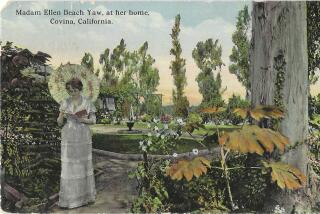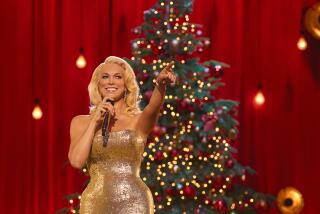Elisabeth Welch, 99; Durable Diva of Jazz and Pop Made ‘Love for Sale’ Her Signature Song
- Share via
Elisabeth Welch, the singer who during a remarkably long career introduced the jazz anthem “Charleston” on Broadway in 1923 and sang Cole Porter’s scandalous “Love for Sale” on Broadway in 1931, has died. She was 99.
A native New Yorker, Welch spent the last seven decades living in London, where she was a star of stage, radio, films and nightclubs. She died Tuesday of undisclosed causes in a retirement home in north London.
Known as a polished interpreter of popular songs, Welch was variously the toast of New York City, Paris and London.
“The Brits worshiped her, absolutely adored her,” Kreuger, president of the Institute of the American Musical, a Los Angeles research library, said Friday.
“Elisabeth Welch wasn’t just another singer; she was a cultural icon, like Ella Fitzgerald is to this country.”
Kreuger, who knew Welch, said the singer “could do anything -- she could sing jazz, she could sing popular music with the most sweet and plaintive voice, and she had absolutely impeccable diction and taste.”
In a recording career that began in 1928 and lasted into the 1990s, he said, her voice “was absolutely untouched by time.”
Welch introduced Harold Arlen and Ted Koehler’s “Stormy Weather” to London audiences in the all-black revue “Dark Doings” in 1933. The song became one of her signatures, as did “Solomon” -- the sassy, Turkish harem-set showstopper that Porter wrote for Welch for his musical “Nymph Errant,” starring Gertrude Lawrence, in London the same year.
But it was “Love for Sale,” which Welch sang in Porter’s Broadway musical “The New Yorkers” in 1931, that brought her notoriety. When an Associated Press reporter suggested to her in 1986 that the song -- a streetwalker’s poignant lament -- might have been considered a tad provocative at the time, Welch broke into a wide grin.
“Darling, are you joking?” she said with a laugh. “In 1931, it was filthy.”
Welch had been singing in cabarets in Paris when she returned to New York to perform at a Manhattan nightclub. One night, she was visited by E. Ray Goetz, Monty Woolley and songwriter Irving Berlin. Goetz was the producer and Woolley the director of “The New Yorkers,” which had recently opened.
They were looking for someone to replace Kathryn Crawford, who was singing “Love for Sale” in the show. The critics had blasted the number as sordid, particularly when sung by a “wholesome” young white singer. A disgusted Porter fled to Paris.
Welch, who had been performing the number in her cabaret act, sang it for the three men and was hired.
The setting for the song also underwent a change: from the front of a chic club on Madison Avenue to a Harlem nightclub.
Welch said in the 1986 interview that she also demanded high-class clothes to wear for the part.
“I walked on in black satin and wore high patent-leather shoes with red heels. I had a red marabou [boa] and a hat with an egret in it. The woman was very grand.”
Welch was born in New York City on Feb. 27, 1904. (Some references say she was born in 1908.) Her father, head gardener and later coachman on a large estate in Englewood, N.J., was part African American and part Native American; her mother was born in Scotland.
Growing up in a racially mixed neighborhood with her two brothers, Edward and John, Welch later recalled, “I never had any feeling about being different from anybody else. It equipped me to be an international person all my life.”
She began singing in the church choir at age 8, earning a reputation as “the loud alto.” Her early ambition was to become a social worker, but the stage had more pull.
Welch, who had a brief marriage to a musician when she was 18, first gained attention in 1923 singing “Charleston” in “Runnin’ Wild” on Broadway. She downplayed that accomplishment, however.
“I just sang the song, then those terrific dancers took over,” she told the Los Angeles Times in 1985. “I always tell people I didn’t dance the Charleston, but they still get it wrong.”
Besides, she said, “It’s a dreary number -- and the verse is worse.”
After “Runnin’ Wild,” Welch appeared in a number of all-black revues on and off Broadway, including “The Chocolate Dandies” (1924) and “Lew Leslie’s Blackbirds of 1928,” which traveled to Paris, where Welch became a popular nightclub singer.
After moving to London, she appeared in numerous West End shows, including Ivor Novello’s “Glamorous Night,” in which she sang “Far Away in Shanty Town.”
She also made regular appearances on the popular BBC radio series “Soft Lights and Sweet Music.”
“Death at Broadcasting House” in 1934 marked the first of her more than a dozen film appearances, including in “Song of Freedom” and “Big Fella,” co-starring African American singer and activist Paul Robeson. The starring roles broke new ground for black actors.
“Of course, Paul tried to persuade me to make a stand for black people,” Welch once said. “Well I had an answer. I’m of mixed blood: African, Native American Indian, Scots and Irish. I said: ‘Paul, I can’t make a stand for all of them. You must excuse me?’ He laughed really hard at that, and gave me a big hug.”
During World War II, Welch entertained troops in Britain and joined John Gielgud, Edith Evans, Beatrice Lillie and Michael Wilding entertaining troops in Malta and Gibraltar.
Gielgud once recalled: “You could hear a pin drop while she sang. But when she finished, the thunder of applause could be heard in the street.”
In 1970, Welch began a succession of one-woman shows, which continued into the ‘90s.
She returned to the West End musical stage in the hit “Pippin” in 1973, and appeared in a 1976 revival of “Cindy-Ella.” On television, she performed in “Song by Song by Lorenz Hart” (1978) and “Song by Song by Cole Porter” (1980).
She was even a gold-clad “goddess” singing “Stormy Weather” in Derek Jarman’s 1979 unorthodox screen version of Shakespeare’s “The Tempest.” In 1980, Welch returned to the New York stage for the first time in nearly half a century to appear in “Black Broadway,” a vaudeville-style show featuring stars of the Harlem Renaissance.
Five years later, she received rave reviews for her performance in “Kern Goes to Hollywood,” a hit London revue of composer Jerome Kern’s best work from the 1930s and ‘40s
Critical praise for her performance continued when the renamed “Jerome Kern Goes to Hollywood” opened on Broadway in 1986 and earned her a Tony nomination.
Frank Rich of the New York Times said: “We must write letters to our congressmen demanding that Elisabeth Welch be detained in the United States forthwith as a national resource too rare and precious to export.” More accolades followed.
In 1986, she launched her one-woman show at New York’s Lucille Lortel Theatre, earning an Obie and a special award from the Outer Critics’ Circle “for making old song favorites sound young, fresh and vital.”
In 1996, Welch made her final professional appearance, in the British television documentary “Black Divas,” singing “Stormy Weather” for the last time in public.
Welch leaves no immediate survivors.
More to Read
The biggest entertainment stories
Get our big stories about Hollywood, film, television, music, arts, culture and more right in your inbox as soon as they publish.
You may occasionally receive promotional content from the Los Angeles Times.










